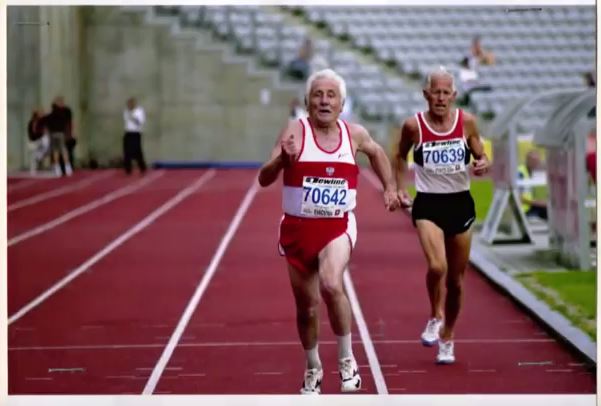Eighteen… to a hundred
Translation: Joanna Cal
About a man who flees from his old age – flees by running and shows that there is something more important in sport than medals and cups, of which he has hundreds – and that something is character. To those who don’t believe in his unusual condition at this age, he answers that he is eighteen…eighteen to a hundred.

The main character of the movie „Forrest Gump” decided at some point in his life to run to the end of a meaningless road. He liked it so much that he chose to extend his route by the whole estate, but it didn’t satisfy him either. That is how Forest ran the length and breadth of the United States. This story best summarises the biography of Zbigniew Petri. Once started in his youth, the adventure of running will never end for him. He was born in 1931 in the Eastern Borderlands, and after the war he moved to Cracow. There, as a young boy, he joined the Cracovia football school. Undouptedly, that was a turning point in his life. The trainers noticed that a slim, tall and sickly young man has some kind of predisposition to run. They couldn’t have known that this would completely change his future. For him, this sport has quite quickly become a passion that continues to this day, being a most sincere, unspoiled by desire for fame or great success. The most important thing for him is to run itself, not medals and cups collecting dust on the shelves. Despite so many successes he remembers only one time of his run – at the first Polish Junior Championships he ran 1500 meters during 4:27,4.
He studied in Gdańsk and then received a work order in Gorzów Wielkopolski. Soon he became a symbol not only of this town, but of the whole Lubuskie Voivodship, where he wanted to promote running. With this in mind, in 1982 he founded the runner’s club „Lubuski Klub Biegacza”. This contributed to the fact that at some point in Gorzów fifteen runs were organized every year. As Mr Petri says, it was the only field in history where this city was fifteen times better than Zielona Góra. The club is still in operation today, and there were over 100 members of it. However, today the idea of the club seems to be in decline, but in the opinion of its initiator there’s nothing wrong with it. With the development of the running culture and the increasing number of organised events, it’s become unnecessary to help players who prefer to choose their competitions individually and feel no desire to integrate with their rivals.
Mr Petri lives in Gorzów to this day. His life is constant travelling. This is the passion he chose and that led him to participate in three European Veterans’ Championships in Potsdam, Århus and Poznań. He took very high places there. Another challenge was the marathon runs. He’s run twenty of them so far, starting in Warsaw, Stockholm, Paris and Hamburg. There were even more of these international successes, but it’s impossible to list them all here. The reason is simple: even Zbigniew Petri himself isn’t able to do it.
In addition to representing the national colours abroad, he has decided to dominate also the national running. He took part in the Polish Veterans’ Championships at the stadium (15 times), in the hall (7 times) and in cross country (5 times). Perhaps the glory and greatness of Mr. Zbigniew will be better proved by two simple numbers: during his veteran career he won eighty-nine medals, including fifty-one gold rings. It took him over twenty years. For comparison, at all World and European Athletics Championships, Polish athletes won a total of seventy-six medals. However, Petri is not interested in such facts. He runs because he loves it.
Once, members of the club came up with the idea that it would be worthwhile to do something extraordinary, something they will remember for the rest of their lives. The idea came from Warsaw. People from the capital decided that it would be valuable to organise a run in honour of those who died for their homeland. It didn’t take long for the members of the club, including its founder, to respond positively. The route from Gorzów Wielkopolski to Monte Cassino, a place that is a symbol of Polish sacrifice, seemed appropriate. Three weeks of running 20 km a day and the goal is reached, and another border of human capabilities is crossed.
By profession Mr Zbigniew is a maths teacher. After all, he is surrounded by figures: times, positions, dates, player numbers. It’s obvious that he likes them. Otherwise he would never have organized a run for 202 participants on 20.02.2002 at 20:02. The latter didn’t succeed, because there came a few uninvited ones… While talking about his work, Mr Petri recalls the figure of Jerzy Cwojdziński, the patron of ‘’Bieg Żakowski’’ – annual run in Gorzów. They had a common passion for running but also the subject they were lecturing.
When Robert Kubica returned to racing after his ill-fated accident and lost hand dexterity, many called him crazy. When Karol Bielecki decided to play handball with one eye, many called him crazy. Probably similarly people would describe a man who after dangerous eye surgery decided to take part in the run ‘’Bieg Bachusa’’ in Zielona Góra, which takes place AT NIGHT and was 10 km long. However, this is nothing in relation to the stunt that this person has done in the past. It’s about a night run on the Gorzów-Grudziądz route. The weather was not good, there was even a storm. However, rain and lightning didn’t disturb the group of those daredevils. They reached the place with a good time, but didn’t meet the organisers of the run there; those who didn’t believe in this venture. The person mentioned earlier was of course Zbigniew Petri. So he is: an outstanding, unique individual who has shown me who I’d like to be in sixty-four years’ time – I just want to do what I love but also I’d like for my body to deceive time. That’s what Mr Zbigniew does. At the same time, I realised how difficult this task is. Not only for me, but for people in general.
Zbigniew Petri died on January 6, 2016 at the age of 85.

